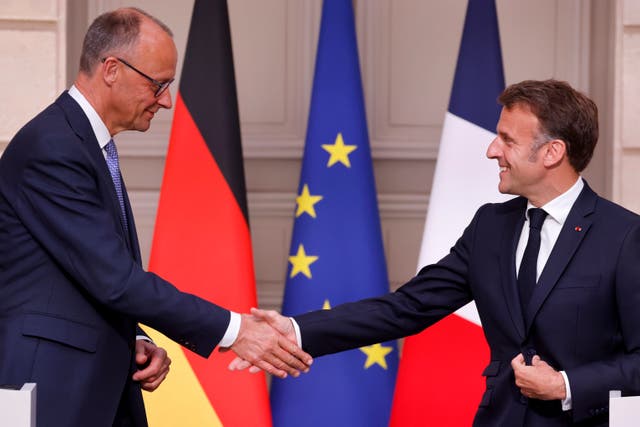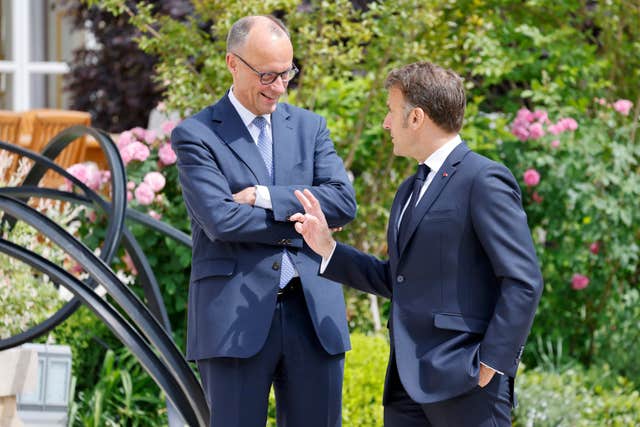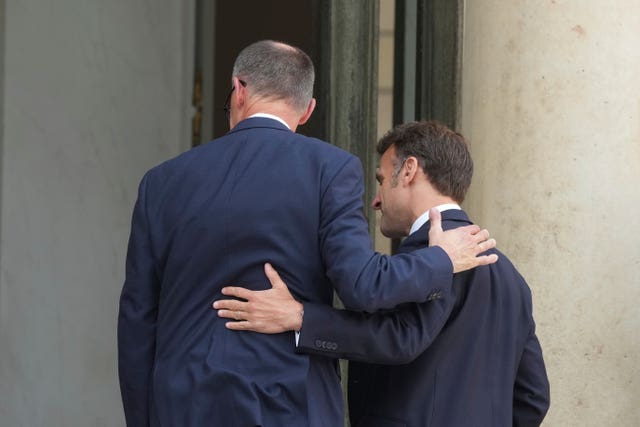Merz stresses European unity during first trip as German chancellor to Paris
Mr Merz and French president Emmanuel Macron met at the Elysee Palace on Wednesday.

Friedrich Merz plunged straight into international crises on his first full day as Germany’s new chancellor on Wednesday, urging India and Pakistan to de-escalate their tensions, vowing support for Ukraine and announcing plans to travel to Kyiv soon.
Mr Merz and French president Emmanuel Macron — both firm believers in the European Union — used their first meeting since the German leader’s appointment on Tuesday to present a united front in the face of US president Donald Trump’s trade war, Russian aggression in Ukraine and other issues causing alarm in Europe.
In a joint news conference, Mr Merz acknowledged that Europe still needed the US for peace in Ukraine, but the duo vowed to strengthen the continent’s security and increase defence spending.

“It is our firm conviction that we cannot end this war in Ukraine without further political and military engagement by the United States of America,” Mr Merz said.
“The Europeans cannot replace this at present.”
With the EU’s largest economies and populations, the tandem of Germany and France has long underpinned the 27-nation bloc, but lost some of its vigour in recent months as leaders in both countries wrestled with domestic issues.
Mr Macron called Russia a “systemic threat” to European security, and said that France and Germany would “accelerate” defence co-operation. He listed working together on tanks, long-range missiles and combat aircraft.
He also said that the countries would start regular meetings of a French-German defence council and together develop new defence technologies “necessary for the wars of tomorrow”.

Mr Merz and Mr Macron — who called his German counterpart “cher Friedrich”, or “dear Friedrich” — are hoping to give the relationship fresh impetus at a crucial time, with Mr Trump and Russian president Vladimir Putin both exerting pressure on the EU, forcing it to rethink its own security.
The pair also teamed up to demand that Israel allow humanitarian aid for civilians in Gaza.
Israel is preparing to ramp up its campaign against Hamas in a devastating war now entering its 20th month. The war began on October 7 2023, when Hamas militants attacked southern Israel, killing 1,200 people and taking 251 hostages.
Israel’s offensive has killed more than 52,000 people in Gaza, many of them women and children, according to Palestinian health officials.
The officials do not distinguish between combatants and civilians in their count.
Mr Merz said it was an “obligation” and urged Israel to be “more responsible”. The chancellor’s comments were striking given Germany’s past and present support for Israel.

Mr Macron said that France could not, on the one hand, defend Ukrainians’ sovereign and territorial rights while ignoring the plight of Palestinians in Gaza.
“We cannot have double standards,” the French leader said.
Both men sought stability between India and Pakistan, saying they viewed the clashes “between these two nuclear powers with the utmost concern”.
India fired missiles into Pakistani-controlled territory in several locations early on Wednesday, killing at least 26 people including a child, in what Pakistan’s leader called an act of war. India said it struck infrastructure used by militants linked to last month’s massacre of tourists in the Indian-controlled portion of Kashmir.
The German leader’s trip to Paris came the day after his historic defeat in the first round of voting in the German parliament. No other post-war candidate for German chancellor has failed to win on the first ballot. He won in the second round.
Traditionally, newly elected German chancellors make a point of visiting their big neighbours in the west and east on the first day in office to stress European unity. Mr Merz will travel to Poland on Wednesday afternoon before returning to Berlin.
Mr Merz’s Paris stop showed that the new chancellor was plunging forthrightly into world affairs, sending a message that Germany is back after his predecessor’s more timid approach. Mr Macron touted their meeting as “a new page” in the French-German partnership.
In particular, France is looking for German backing for increased EU defence spending in the face of the perceived threat to European security by Russia and concerns that Mr Trump is pivoting away from its post-Second World War transatlantic relationship with Europe to focus resources on countering China.
The French president also said France and Germany would “act hand in hand” in the face of Mr Trump’s tariffs and work for “a united European response and a balanced outcome that respects our interests”.
The stops in Paris and Warsaw are happening on the 80th anniversary of Nazi Germany’s unconditional surrender in the Second World War. Mr Macron’s meeting with his third German chancellor as France’s president will be particularly loaded with symbolism for the two countries who were bitter enemies in the two world wars.
“German-French friendship is a gift, a gift of forgiveness and reconciliation, especially for us Germans,” Mr Merz said on Wednesday.
The First World War ended with an armistice agreement signed in a railway car north of Paris. Nazi leader Adolf Hitler then used the same railway car in accepting France’s capitulation in 1940, after its defences succumbed to the German invasion.





